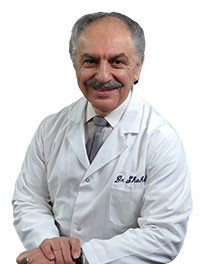Treatment for Gastroenteritis in Midland Park, NJ
What Is Gastroenteritis?

Gastroenteritis, commonly referred to as the stomach flu, is an intestinal infection characterized by inflammation of the gastrointestinal tract. Unlike influenza, which only affects the respiratory system, gastroenteritis affects the lining of the stomach, small intestine, and large intestine. Most cases of gastroenteritis are infectious—caused by a virus, bacteria, or parasites—and spread through contaminated food, water, or other infected individuals.
In healthy individuals, gastroenteritis can be uncomfortable but self-limiting, as the body is able to rid itself of the infectious agent after the disease has taken its course. However, gastroenteritis can be a serious health concern for some, particularly infants and children, the elderly, and individuals who have severely compromised immune systems.
Treatment for gastroenteritis may include options to help support the body's immune response, decrease the duration of illness, and help rid the body of the pathogen. More serious cases of gastroenteritis may require medical intervention to rehydrate and medicate the body to rid it of the pathogen.
To schedule a consultation with a healthcare practitioner in Midland Park who specializes in treating gastroenteritis, call (201) 806-6099 or contact Dr. M.T. Shahab online.
Gastroenteritis Causes & Types
Gastroenteritis can be spread by coming into contact with someone that has the virus, ingesting contaminated food or water, or coming into contact with feces. In certain, rarer, instances, gastroenteritis may occur as the result of medication, toxins, or exposure to heavy metal.
There are three main gastroenteritis causes: a virus, bacterium, or parasite. The specific organisms and toxins that cause gastroenteritis are listed below.
Viral Gastroenteritis
Viral gastroenteritis is considered one of the most common illnesses in the U.S. The viruses most often to blame for the condition's development include:
- Norovirus : Acquired through water and food contamination and person-to-person transmission, the norovirus can infect people at any age.
- Rotavirus: Attained through fecal contamination, the rotavirus is the leading cause of gastroenteritis in infants and children.
- Astrovirus: Attained through fecal contamination, the astrovirus most commonly occurs in infants and children; however, symptoms are generally milder than other forms of viral gastroenteritis.
Bacterial Gastroenteritis
Less common than viral gastroenteritis, bacterial gastroenteritis can be caused by:
- Salmonella: Contracted through contaminated pork and unpasteurized milk
- Campylobacter: Acquired through contaminated meat, dairy, and eggs
- Shigella: Obtained through contaminated water and swimming pools
- Escherichia coli: Acquired through contaminated ground beef and poultry
- Clostridium difficile: Infection that can occur in hospitalized patients receiving antibiotics
Parasitic Gastroenteritis
Intestinal parasites can invade the intestinal mucosa, causing gastroenteritis symptoms. The most common of these parasites include:
- Giardia : Acquired through person-to-person contact or contaminated water
- Cryptosporidium: Acquired through contaminated water
Stomach Flu Symptoms
The main symptoms of gastroenteritis include watery diarrhea and vomiting. Additional symptoms include:
- Stomach pain
- Cramping
- Fever
- Nausea
- Headache
Symptoms typically appear quickly upon infection and can range from mild to severe. Severe diarrhea and vomiting can lead to dehydration, causing dry mouth, dizziness, thirst, and dry skin. If you are experiencing signs of dehydration, it is important to seek medical care as certain cases of dehydration can be life threatening.
Diagnosing Gastroenteritis
Diagnosis of gastroenteritis requires a clinical evaluation. Stool testing can also be ordered to pinpoint specific bacterial or parasitic infections—identifying the exact microorganism can help determine the correct pharmaceutical agent required to help eliminate the pathogen.
General tests to assess serum electrolyte levels and kidney function can be ordered for those that have been seriously ill and for those that have not seen an improvement in their symptoms after 5 days.
Stomach Flu Treatment
Treatment for gastroenteritis includes oral or intravenous rehydration, antibiotics, anti-parasitic agents, or anti-diarrheal agents. Be sure to speak with your healthcare provider before taking an over-the-counter, anti-diarrheal agent, as these kinds of medications can react negatively to certain pathogens.
Supportive treatment is key for individuals suffering from gastroenteritis. Bed rest and hydration are important to allow the body to heal and avoid dehydration. In addition, patients with gastroenteritis should consider:
- Drinking plenty of fluids throughout the day, particularly after bouts of vomiting or diarrhea
- Consuming sports drinks that have a balanced ratio of glucose and electrolytes
- Eating small meals and broth soups through the day, particularly salty foods such as crackers, to help replenish sodium levels
- Consuming foods or drinks that are high in potassium such as bananas and fruit juice
- Avoiding dairy and high fiber foods
Natural treatment options are available to help support the immune system, ease discomfort and fight pathogenic microorganisms. These options include:
- High dose probiotics (over 100 billion colony forming units per day) to help ease gastroenteritis and fight off harmful microbes
- Ginger to help combat infection and ease stomach pain
- Mint tea to help ease stomach pain, inflammation in the GI tract, and prevent vomiting
- Cinnamon and honey tea to support immunity and reduce inflammation
- Taking natural anti-bacterial agents such as Echinacea, goldenseal, and astragalus root extract
- Taking natural anti-parasitic agents such as wormwood, black walnut hulls, berberine, and grapefruit extract
Gastroenteritis often resolves after the course of about a week. However, gastroenteritis that occurs in infants, children, the elderly, individuals with compromised immune systems, or patients who have had symptoms without improvement for five days should seek medical care as soon as possible. To meet with a healthcare practitioner in Midland Park who can provide gastroenteritis treatment, call (201) 806-6099 or contact Dr. M.T. Shahab online.
Medwell Orthopedics & Functional Medicine for Men & Women
Address
33 Central AveMidland Park, NJ 07432
(201) 806-6099
www.BergenCountyDoctors.com
Hours
Mon:
8:00 am - 8:00 pm
Tue:
2:00 pm - 7:00 pm
Wed:
8:00 am - 6:30 pm
Thu:
8:00 am - 1:00 pm
Fri:
8:00 am - 6:30 pm
Sat:
9:00 am - 1:00 pm
Sun:
By Appointment Only


